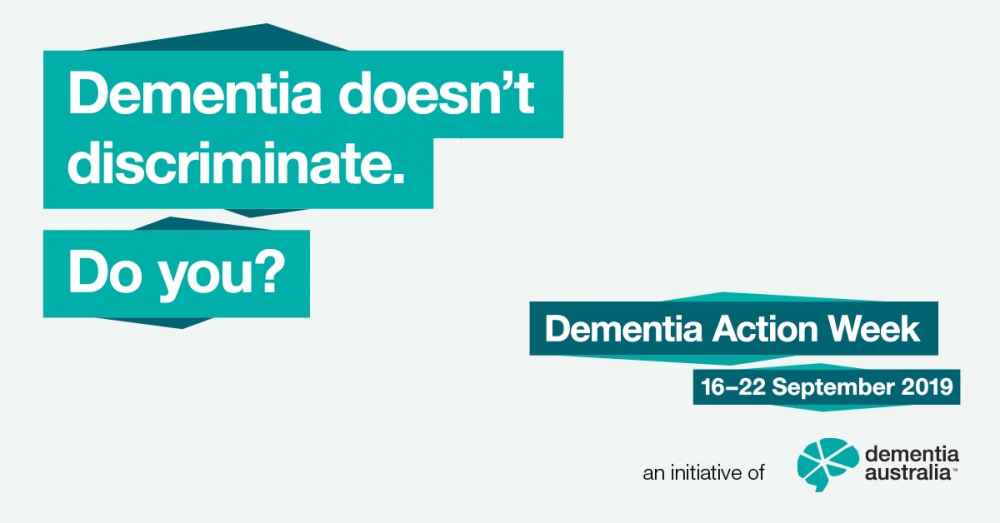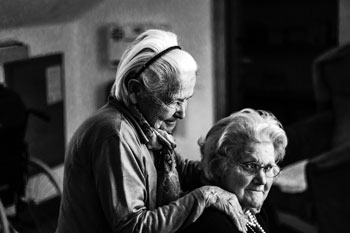A recent survey reveals that people living with dementia and their primary carers — mostly spouses — feel alone. They are almost twice as likely to experience high rates of loneliness because of stigma.
In 2016, the acting CEO of Alzheimer’s Australia Vic, Leanne Wenig confirmed the long-recognised fact that friendships and family relationships fall away dramatically when a person is diagnosed with dementia. Ms Wenig puts this down to “a general lack of awareness and understanding of dementia” that leaves people uncertain as to “how to interact with their friend or loved one with dementia.”*

This is the worst possible outcome for all concerned
People with dementia need the company and support of friends, and their carers need company too and regular breaks from their caring role. The Alzheimer’s Australia Report 2017 on Dementia and the Impact of Stigma confirms both people with dementia and their primary carers feel more isolated than the general population stating “I feel lonely more often than usual”.
Our message to people living with dementia is a powerful but simple affirmation that ‘you are not alone’.
We all have a role to play…
…in ensuring that relatives, friends and colleagues living with dementia are afforded the same companionship, love, respect and understanding as any other member of our community.
We asked Daughterly Care professional Hourly Caregivers and Live in Carers how they would support their best friend, if she or he was diagnosed with a form of dementia.
Their thirteen insightful answers are in the “comments” section below and will give you valuable ideas for how you can continue to support your family and friends.
Feel welcome to add a comment on how you maintain your friendship with a friend who has a diagnosis of dementia.
Daughterly Care Managing Director and Registered Nurse, Verlie Hall says
“the fact is you can have a form of dementia and still live a life that has meaning, purpose, value and joy. Read how best friends, Helena and Elizabeth, maintained their friendship through 10 years of dementia”
True Story:
Daughterly Care Helps Devoted Friends of 40 Years Stay True

Helena and Elizabeth had been best of friends for 40 years or more. Helena has dementia and is otherwise in perfect health, while Elizabeth is physically frail and mentally sharp.
Every Saturday without fail…
…one of Daughterly Care’s Caregivers prompted and assisted Helena to shower and dress, made sure she enjoyed a delicious breakfast and took her prescribed medications. After breakfast, our Caregiver drove Helena to Elizabeth’s unit, and the two friends would pass the day deep in conversation, completely happy in each other’s company.
At 4.00pm our Caregiver would return to pick Helena up and drive her home, make Helena’s dinner and help her to get ready for bed.
For 10 years these Saturday friendship-days visits continued
Helena’s dementia, if anything, seemed to strengthen the friendship between the two women as, in their shared adversity, they forged an even deeper bond.
Even after Helena had been placed in a nursing home for the last year of her life, when Saturday came round her familiar Daughterly Care Caregiver would pick her up from the nursing home and drive her to Elizabeth’s unit. There, the laughter rang out and the joy rolled on all day.
The secret to their continued friendship was a very simple adjustment by Elizabeth
Instead of questioning Helena with “Do you remember when”, Elizabeth would say: “One of the times I most enjoyed was when we took the kids camping to The Entrance in the Christmas holidays and we taught Sally to swim.”
Elizabeth would take out her photo album and the two friends would revisit those treasured moments over and over. And Helena’s conversation would flow naturally and made perfect sense. Helena’s daughter also made an adjustment. She realised that Elizabeth’s frailty meant for their friendship to continue she had to organise for her Mum to spend each Saturday at Elizabeth’s home.
It was an enjoyable day for both Helena and Elizabeth for 10 years.
Instinctively, Elizabeth had found a way for her friend to re-live the happiness of their shared past, without requiring Helena to remember, without questioning her, without interrogating her.
Instead of saying “Remember when…”, she would simply say “I remember when we…”
Alzheimer’s Australia released a number of print resources — such as ‘Friends matter’, ‘Friends and Family matter’ and ‘Talk to me’.
These publications offer practical advice to the 1.2 million family and friends of more than 413,000 Australians living with dementia.
The brochure, ‘Talk to me’ offers simple practical advice as how best to communicate with people living with dementia.
‘Friends matter’ and ‘Friends and Family matter’ invite us to see the world as one living with dementia sees it so that we can actively help to break down the barriers and pre-conceptions that so often lead to exclusion and isolation.
Verlie added “People living with dementia are working very hard to compensate for the symptoms of their disease. Being prepared to ‘walk a mile in their shoes’ can help family and friends understand and be more accepting. More importantly they can enable the joy of family and friendship to continue.”
Short, easy to read and filled with valuable insights
These brochures are freely available to read online or download and print.
Click here for Friends Matter Government booklet and checklist
Click here for the Talk to Me booklet
With almost 21 years’ experience, Daughterly Care offers elders living with a form of dementia a wide range of support options including music, reminiscence validation therapies, art therapy and communication strategies. No-one knows better than us that effective support is a combination of friendship, genuine respect and a commitment to understanding the challenges a person living with dementia faces every day of their lives and providing personalised and tailored support and in home care that is most helpful to the person.
If you care for someone living with dementia take a 2 hour break from your caring role every time we visit.
And for a longer break ask us about the Government funded carer respite service works. If you would like more information on how we can support you or a family member, take a look at our services or give us a call on 02 9970 7333.
SOURCE *(see http://www.australianageingagenda.com.au/)
Question: If your friend had dementia, what activities could you keep doing with your friend? Let us know by adding a comment below. Your email address is not shown online.




If my friend had dementia and I really hope none of my friends ever do get dementia. And I am hoping there will be a discovery that will prevent dementia very soon.
I feel it’s very important to keep in touch and do as we usually do have a coffee, have a chat and a laugh and been a care worker I have a different perspective on dementia and I know the importance of continuing a friendship regardless of changed circumstances the thing I feel with my friend is when, they start to lose other friends that is when I’d really be supportive and be caring and loving to them in their isolation from their other friends.
Let’s hope we get answers really quickly and we won’t have to face a supposedly situation, of a friend with dementia.
Christine Cowin
If my friend had dementia I would continue going to music venues with her/him. This is an affordable source of entertainment particularly at the RSL’s. Sometimes music concerts are also held during the afternoons at various locations and include lunch too. Generally access and parking to the clubs is good which is also ideal for the less abled bodied. For people living with dementia (even advanced dementia) music is a wonderful source of pleasure.
Great info to reference especially I remember when we…..
As we both share a love of music, we would continue to go to live concerts together and dance on the dance floor together, or if not feeling up to that, we would remain seated enjoying the atmosphere of the live music and watching people enjoy themselves.
If that is not an option on any given day, we would remain at home, her place or mine, and turn up the music and have a dance in the loungeroom. I would choose music to suit the mood of that day and we would also eat and drink and be merry. I would make a picnic with healthy foods and beverages that I know she enjoys. If she wasn’t up for dancing, I would again feel the mood and we would listen to music and talk together.
If we wanted to spend some time outside in the fresh air, the garden would be our obvious choice and we would smell the roses and see what is flowering and fruiting and take it from there.
I would keep re enforcing the value of our friendship by keeping in touch as much as possible. I would include activities that we could share together that would help to stimulate my friends brain which could be dance/ music, reminiscing, playing cards or even simple enjoyed chatter..
Spending quality time with photo albums, bringing to life the fun stories that was connected to the photo’s sharing lots of laughter and being compassionate.
If I had a friend with Dementia. I would take him/her to a favourite place we had regularly frequented together such as a beach for a walk or coffee shop so we could relax, reminisque and enjoy the moment together.
I would put a scrap book together of all the highlights of our history together and reminisce all the good times. I would try to do as many of the normal things we always did together and make sure we laughed a lot as laughter is the best medicine for everyone.
To keep my friend involved in all aspects of life as much as possible especially in the things she loved doing.
I like the idea of a photo album. We could always revisit the past by looking at the pictures. Talk about the past and present. Listen to music which we used to when we were young. We even might have a dance…
If my friend had late stage dementia I would try hard to make her/him feel loved and cared for: we could play music, read, go outside in the garden, brush hair, rub cream on arms. Although there may be an inability to communicate,body language can reveal a person’s likes and dislikes , and it would be very much dependent on how my friend felt on the day.
“if my friend had mid-stage dementia I would love to make a picture album or video thag covers some of the memories we have shared over the years. I would watch or read through the album with my friend to prompt reminiscent and discussion of our memories. I feel as they progress this would help them to stay connected to themselves. Also spending quality time with my friend would keep them socially active and connected to their community and help them to feel they are not facing this alone.
After I have attended the Alzheimer Australia course I would like to add that I would help my friends family . I would pass on the knowledge I have gained in that course to support also the family of my friend. Also with practical support like the change of the bathroom, rugs….
The possibility is a close friend suffering with this disease would make me compelled to not change my feelings as we have memories that include photos of times shared I would continue to replicate those memories as far as my friend is able. Beach walks, picnics movies or just window shopping so we / I can stay engaged in friendship! With future memories!
If my friend had mid stage dementia I would pick her up for our weekly visit to the local RSL for dinner. This is an important ritual for us where we have an enjoyable cheap dinner, chat and gossip, have a laugh and say hello to a few other regulars at the club. I know she would love for this to continue as long as possible.
As I said last year I hope that there will soon be a medical breakthrough that Dementia is no more and the world is safe from this crippling condition that is affecting many lives and causing undue stress and sadness for loved ones witnessing the dramatic changes this disease inflicts on their families, friends and social groups. We human beings are so precious and to have fulfilling lives throughout our time on earth is so important I pray that new discoveries soon open up healthy ways of living.
Christine Cowin
If my loved ones or friends were to have Dementia our friendship will still be exactly the same they are still my friend or family member nothing has changed just a circumstance.
This is a true story of my friend of 27 years Cathy, she has alcohol related dementia. Cathy has been in a nursing home for over 10 years. The toughest part for some friends has been that they have found it difficult to stay in touch. Cathy during our playgroup and our school days with our children was the first to drop off a meal, host a lunch and enjoy life and a laugh together but if the roles were reversed we would I am sure love visitors like Cathy does. As I enter the nursing home I often call out in my rather strident voice ” hello ” and she often calls out ” Robbie”. We share a cuppa and a lemon tart every visit as well she had a beautiful garden so we often visit the local garden nursery or take a stroll in the park chatting about the flowers especially during spring time, or a pamper day. Cathy loved dancing we still call her ” the dancing queen” she remembers this and we sit together and watch the DVD’s of the shows – she smiles and often comments or sings a few words. We both had lots of family photos so I have put these in an album and we sit and share tales about holiday’s together ” I remember the time we went fishing with all the kids or skiing together” as we share our photos often with a smile or Cathy points to the children and we name them together.We have enjoyed many simple pleasures over many years, as we continue to do so today. A very special friendship.
If my best friend was in the early stages of dementia, I believe from experience it’s vital to organize a routine that is manageable for family/carers/other friends. The physical body responds positively to routine as will the persons psychological capacity. Photo’s, songs, phrases, places with specific smells – these timelines are crucial when the condition worsens. My best friend and I grew up singing opera on stage & studying classical piano. All fond memories that stimulate & engage. I also hope that a cure is found soon. In the meantime, I advise friends /family to keep the mind occupied & always attempt to learn new things. The brain is a muscle that requires to be excercised as does the body